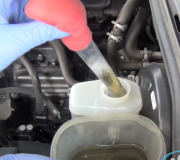Yes. The glaring clue is not the blown-up cap. It is the rubber bladder seal under the cap. You will find it is almost impossible to reset it back into the cap.
This is caused by the brake fluid being contaminated with petroleum product. All the rubber parts in the hydraulic system will be grown the same way. The lip seals inside the master cylinder will grow past the fluid return ports and block them. That keeps the trapped fluid under pressure and unable to return to the reservoir, and that keeps the brakes partially applied. The excessive heat buildup from driving the truck like that makes the brake fluid get real hot and expand. Since the fluid is trapped, when it expands, it applies the brakes harder. Eventually the truck will barely move and one or two wheels will get real hot.
The only proper fix is to remove everything with rubber parts, flush and dry the steel lines, then install new parts. That includes replacing the calipers and wheel cylinders, all rubber flex hoses, the combination valve, and the master cylinder. If any part, such as the calipers, are left on the truck, the contamination will leach out of the seals and recontaminate the new fluid.
Every week we read about someone who accidentally put power steering fluid, engine oil, or transmission fluid in the master cylinder but there are other ways to contaminate the fluid. One problem that was more common years ago was repacking front wheel bearings, then wiping hands on a rag, then reseating the bladder seal into the cap when refilling the master cylinder. The grease residue on fingertips is enough to contaminate the system.
Another problem showed up many years ago at a mass merchandiser. A new mechanic wiped out a funnel used for engine oil, then used it to fill a brake pressure bleeder ball. The residue in the funnel contaminated five gallons of brake fluid and many cars.
Experienced brake mechanics will even wash their hands with soap and water before touching any seal or other rubber parts they are working on. Also, they will never use penetrating oil to free up rusted fittings in the brake system.
Brake fluid can be contaminated with water too but that will not cause the rubber parts to swell. That will simply lower the boiling point from well over 400 degrees to closer to 212 degrees, and it will promote corrosion of metal parts but that is all. Moisture contamination comes from leaving the master cylinder cap off or the cap off the bottle of new fluid. Brake fluid sucks humidity out of the air, and it will absorb some over time in the truck's hydraulic system.
Saturday, March 31st, 2018 AT 2:27 PM



